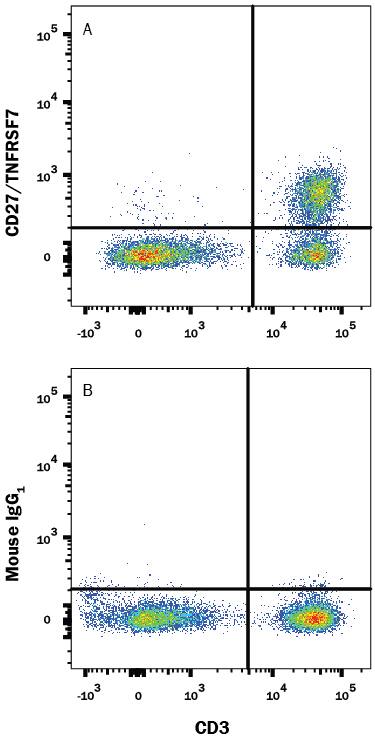Human CD27/TNFRSF7 APC-conjugated Antibody
R&D Systems, part of Bio-Techne | Catalog # FAB382A


Key Product Details
Species Reactivity
Applications
Label
Antibody Source
Product Specifications
Immunogen
Thr21-Ile192
Accession # P26842
Specificity
Clonality
Host
Isotype
Scientific Data Images for Human CD27/TNFRSF7 APC-conjugated Antibody
Detection of CD27/TNFRSF7 in Human PBMCs by Flow Cytometry.
Human peripheral blood mononuclear cells (PBMCs) were stained with Mouse Anti-Human CD3e PE-conjugated Monoclonal Antibody (Catalog # FAB100P) and either (A) Mouse Anti-Human CD27/TNFRSF7 APC-conjugated Monoclonal Antibody (Catalog # FAB382A) or (B) Mouse IgG1Allophycocyanin Isotype Control (Catalog # IC002A). View our protocol for Staining Membrane-associated Proteins.Applications for Human CD27/TNFRSF7 APC-conjugated Antibody
Flow Cytometry
Sample: Human peripheral blood mononuclear cells (PBMCs)
Formulation, Preparation, and Storage
Purification
Formulation
Shipping
Stability & Storage
Background: CD27/TNFRSF7
Human CD27 is a 50-55 kDa lymphocyte-specific member of the TNF receptor superfamily. CD27 is expressed on a subset of human thymocytes as well as NK cells, B cells, and CD4+ and CD8+ T cells. CD27 expression is up-regulated after TCR stimulation. Within the CD4+ compartment, it is preferentially expressed on CD45RA+ cells. In contrast, it is preferentially expressed on CD45RO+ cells in the CD8+ compartment. CD27 also appears to be a potential marker for memory B cells. It exists as both a disulfide-linked dimer on the cell surface and as a soluble 32 kDa protein found in serum. Human CD27 is a 260 amino acid (aa) protein with a 19 aa signal, a 173 aa extracellular domain, a 21 aa transmembrane domain, and a 48 aa cytoplasmic domain. The ligand for CD27 is CD70. CD70 is expressed on thymic stromal cells and multiple activated leukocytes including NK cells, CD4+ and CD8+ T cells, and gamma delta T cells. Additionally a subset of activated B cells express CD70. The CD27/CD70 interaction appears to be a weak costimulatory pathway involved in T cell and B cell immune response. CD27/CD70 interactions may be more involved in controlling the expansion phase of an immune response. This would be in contrast to B7/CD28 interactions, which are important for the activation phase of immune responses. Over aa 21-192, human and mouse CD27 share 60% aa sequence identity.
Alternate Names
Gene Symbol
UniProt
Additional CD27/TNFRSF7 Products
Product Documents for Human CD27/TNFRSF7 APC-conjugated Antibody
Product Specific Notices for Human CD27/TNFRSF7 APC-conjugated Antibody
For research use only